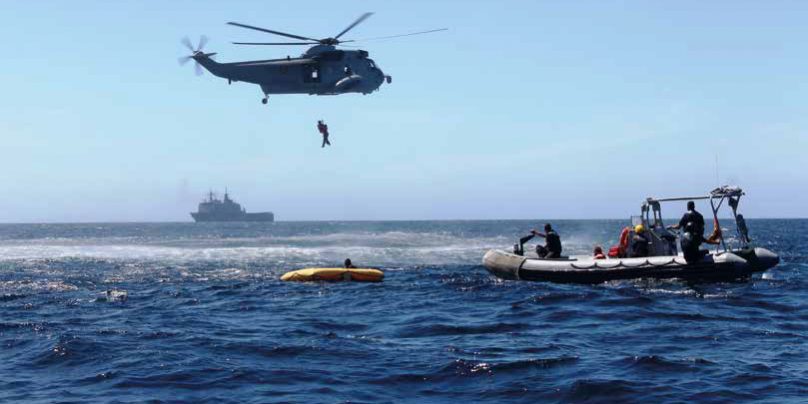by Charlina Vitcheva, Director-General, DG Maritime Affairs and Fisheries (DG MARE), European Commission, Brussels
The new EU Maritime Security Strategy (EUMSS)1 comes at a time of increasing geopolitical strife and rapid technological developments, answering a broad range of security challenges in the global maritime domain. The EU Member States combined have the largest Exclusive Economic Zone (EEZ) in the world. Our economy depends on the ocean for over 80% of global trade. About 99% of data exchanged worldwide is transported through undersea cables. And about two thirds of the world’s oil and gas supply is either extracted at or transported by sea.
Evolving threats in the maritime domain
The interests and security of the EU and its citizens are increasingly subjected to new and evolving threats in the maritime domain. Much has changed on the global geopolitical arena since the adoption of the original EUMSS in 2014. We are living in an increasingly multipolar world, witnessing large-scale acts of aggression, most notably Russia’s ongoing war against Ukraine, which has repercussions across the world. We are facing an increase in revisionist threats, expansionist rhetoric, violations of national sovereignty and challenges to the rule of law and the international order, many of which are carried out at sea.
Recent attacks on critical infrastructure
In the last year or so, we witnessed the attack on the Nord Stream 2 gas pipeline, the deliberate severing of communication cables between Svalbard and the Norwegian mainland, the
suspicious presence of Russian vessels around energy installations in the North Sea, and various other attacks and threats on European maritime critical infrastructure.
Vital protection of a blue economy
The development of a sustainable blue economy also clearly depends on maritime security, but one needs to picture the scale of investment we have to undertake in Europe in the coming years for offshore energy production to reach our climate targets, to understand the challenges ahead. This type of critical infrastructure will not only have to be resilient but requires constant surveillance and protection against physical and cyber threats.
Degradation of the marine environment
The new EUMSS highlights the significant and potentially long-lasting impacts of climate change and degradation of the marine environment on maritime security, including flooding in coastal areas and islands, the loss of coral reefs, mangroves and other wetlands, and the depletion of fish stocks.2 These risk multipliers increase instability and inequality, exacerbating transnational crime, piracy, tensions over marine resources, and contribute to forced migration and migrant smuggling.
Tackling the problem of piracy
In various regions, piracy, kidnapping for ransom, the trafficking and smuggling of people, and the trafficking of weapons and illicit substances at sea are increasingly challenging. While EUNAVFOR Atalanta has been successful in tackling piracy around the Horn of Africa, in the last few years the Gulf of Guinea has become a hotspot for piracy and kidnapping for ransom, threatening EU interests linked to trade, energy and shipping. The EU is tackling this threat head-on, through the Coordinated Maritime Presence (CMP) concept, where Member States have ensured a constant presence of their naval assets in the region. Given the success of the CMP in the Gulf of Guinea, we are now expanding the concept to the northwestern Indian Ocean. Building on such successful missions and considering the geopolitical developments, it is important that the EU increases its contribution in the international arena, also drawing on the world-class naval capabilities of its Member States.
Objectives of the EUMSS
The new EUMSS will respond to the new and old challenges in the maritime domain. The EUMSS now comprises six strategic objectives: stepping up maritime activities at sea; strengthening cooperation with partners; leading on maritime domain awareness; managing specific risks and threats; boosting capabilities; and enhancing education and training in maritime security fields.
To meet those objectives, the revised action plan of the EUMSS contains a multitude of actions, including:
- a large-scale annual maritime security exercise with naval assets, coastguards and relevant authorities from as many Member States as possible;
- expanding the Coordinated Maritime Presence concept to new maritime areas of interest;
- strengthening cooperation between the EU and NATO and like-minded countries; furthering information exchange platforms;
- strengthening and interconnecting information exchange platforms such as the Common Information Sharing Environment for the maritime domain (CISE) and the naval platform (MARSUR);
- protecting critical maritime infrastructure and ships from physical and cyber threats and tackling unexploded ordnance and mines at sea;
- developing common requirements and concepts for defence technologies;
- stepping up work on projects such as the European Patrol Corvette, unmanned systems, improving our anti-submarine capabilities;
- boosting hybrid and cybersecurity qualifications and conducting training and exercises open to non-EU partners;
- strengthening capabilities and training to respond to climate-related disasters at sea;
- and developing renewable technology suitable for use by navies and coast guards.
Preparing for future challenges
Maritime security challenges are expected to increase in number and complexity over the coming years, while perpetrators undermining maritime security are also increasing in numbers and diversity, including state and non-state actors. In the face of these challenges, the revised EUMSS constitutes an integral framework, fully adapted to respond, in a coordinated and comprehensive manner, to present and future maritime security challenges.
Charlina Vitcheva
has been the Director-General of the European Commission’s DG MARE since June 2020. Prior to this, she was the acting Director-General for the Joint Research Centre (JRC) from November 2019 to April 2020. Previously, she was Director of Smart & Sustainable Growth in Southern Europe at the DG Regional and Urban Policy (DG REGIO) and also held a director’s position on Inclusive Growth, Territorial and Urban Development and Northern Europe.







